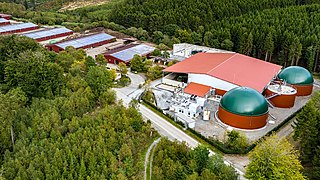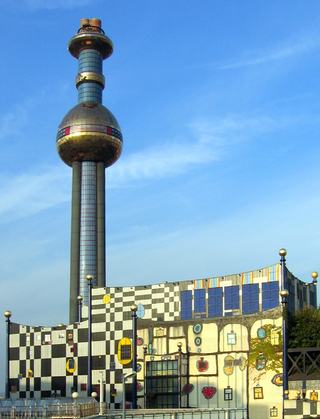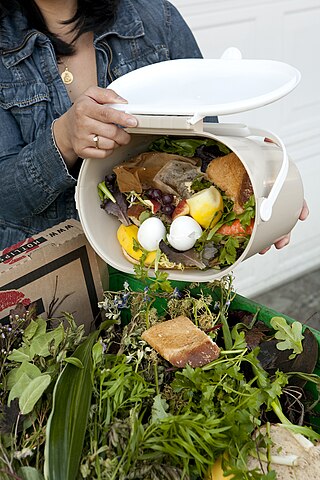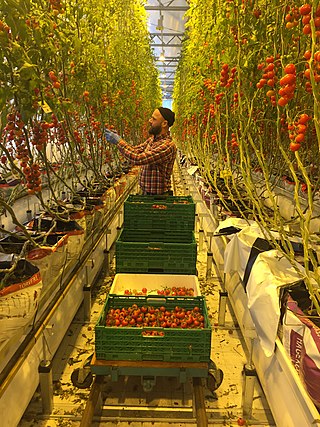Related Research Articles

Biogas is a gaseous renewable energy source produced from raw materials such as agricultural waste, manure, municipal waste, plant material, sewage, green waste, wastewater, and food waste. Biogas is produced by anaerobic digestion with anaerobic organisms or methanogens inside an anaerobic digester, biodigester or a bioreactor. The gas composition is primarily methane and carbon dioxide and may have small amounts of hydrogen sulfide, moisture and siloxanes. The gases methane and hydrogen, can be combusted or oxidized with oxygen. This energy release allows biogas to be used as a fuel; it can be used in fuel cells and for heating purpose, such as in cooking. It can also be used in a gas engine to convert the energy in the gas into electricity and heat.

Biofuel is a fuel that is produced over a short time span from biomass, rather than by the very slow natural processes involved in the formation of fossil fuels, such as oil. Biofuel can be produced from plants or from agricultural, domestic or industrial biowaste.
Alternative technology is a term used to refer to technologies that are more environmentally friendly than the functionally equivalent technologies dominant in current practice. The term was coined by Peter Harper, one of the founders of the Centre for Alternative Technology, North Wales, in Undercurrents (magazine) in the 1970s. Alternative Technologies are created to be safer, cleaner, and overall more efficient. The goals of alternative technology are to decrease demand for critical elements by ensuring a secure supply of technology that is environmentally friendly, increased efficiency with lower costs, and with more common materials to avoid potential future materials crises. Alternative technologies use renewable energy sources such as solar power and wind energy. Some alternative technologies have in the past or may in the future become widely adopted, after which they might no longer be considered "alternative." For example, the use of wind turbines to produce electricity.

Anaerobic digestion is a sequence of processes by which microorganisms break down biodegradable material in the absence of oxygen. The process is used for industrial or domestic purposes to manage waste or to produce fuels. Much of the fermentation used industrially to produce food and drink products, as well as home fermentation, uses anaerobic digestion.
Articles related to waste management include:
Renewable natural gas (RNG), also known as biomethane or sustainable natural gas (SNG), is a biogas which has been upgraded to a quality similar to fossil natural gas and has a methane concentration of 90% or greater. By removing CO2 and other impurities from biogas, and increasing the concentration of methane to a level similar to fossil natural gas, it becomes possible to distribute RNG to customers via existing gas pipeline networks. RNG can be used in existing appliances, including vehicles with natural gas burning engines (natural gas vehicles). Renewable natural gas is a subset of synthetic natural gas or substitute natural gas (SNG).

Waste-to-energy (WtE) or energy-from-waste (EfW) is the process of generating energy in the form of electricity and/or heat from the primary treatment of waste, or the processing of waste into a fuel source. WtE is a form of energy recovery. Most WtE processes generate electricity and/or heat directly through combustion, or produce a combustible fuel commodity, such as methane, methanol, ethanol or synthetic fuels.
A mechanical biological treatment (MBT) system is a type of waste processing facility that combines a sorting facility with a form of biological treatment such as composting or anaerobic digestion. MBT plants are designed to process mixed household waste as well as commercial and industrial wastes.

Biodegradable waste includes any organic matter in waste which can be broken down into carbon dioxide, water, methane, compost, humus, and simple organic molecules by micro-organisms and other living things by composting, aerobic digestion, anaerobic digestion or similar processes. It mainly includes kitchen waste, ash, soil, dung and other plant matter. In waste management, it also includes some inorganic materials which can be decomposed by bacteria. Such materials include gypsum and its products such as plasterboard and other simple sulfates which can be decomposed by sulfate reducing bacteria to yield hydrogen sulfide in anaerobic land-fill conditions.
The Organics Recycling Group (ORG), formerly the Association for Organics Recycling (AfOR) and before that the Composting Association, is the leading trade organisation for the biodegradable waste management industry in the UK. It helped to develop the BSI PAS 100 industry standard for composts.

Methanobacteria is a class of archaeans in the kingdom Euryarchaeota. Several of the classes of the Euryarchaeota are methanogens and the Methanobacteria are one of these classes.

Source-separated organics (SSO) is the system by which waste generators segregate compostable materials from other waste streams at the source for separate collection.

Clarke Energy is part of the Kohler Company and is a multinational specialist in the sale, engineering, installation and maintenance of power plants that use gas engines. Clarke Energy is an independent company with its global head offices located in Knowsley, Liverpool and is an authorised distributor and service partner for INNIO's Jenbacher and Waukesha gas engines. Clarke Energy has over 1,000 staff in seventeen countries worldwide including Algeria, Australia, Bangladesh, Cameroon, France, India, Ireland, New Zealand, Nigeria, Tanzania, Tunisia, South Africa, Botswana, Mozambique, Swaziland and Lesotho. The company maintains a portfolio of applications for both low-carbon power and renewable energy generation.

The Association for Renewable Energy and Clean Technology, previously known as Renewable Energy Association (REA), is a renewable energy and clean technology trade association in the UK encompassing all of renewables industry in the United Kingdom. REA covers renewable power & flexibility, heat and cooling, circular bioresources and transport. The REA is a not-for-profit company.
Iona Capital Ltd is a fund management institution that specializes in the management of equity and debt investments for private and institutional clients. Its investment strategy focuses on seeking out promising start-up companies that align with the UK Government's goal of reducing waste sent to landfills. In addition to its environmental objectives, the company also places a significant emphasis on identifying and partnering with strong management teams.

Harvest Power, Inc. was a privately held organics management company headquartered in Waltham, Massachusetts that specializes in converting food waste and yard waste into biofuel, compost, mulch and fertilizer. In 2014 Fast Company named it one of the most innovative companies in the world. In August of 2020 Harvest Power Orlando ceased operations for unknown reasons and all assets were put up for sale; the company was dissolved in April 2021.
Sharad P Kale is a scientist known for developing a biogas plant based on biodegradable waste resource (Nisargruna). He is the head of Technology Transfer and Collaboration at Bhabha Atomic Research Centre (BARC). On 26 January 2013, the Government of India honoured him with the Padma Shri Award in the Discipline of Science and Engineering.
Himark Biogas Inc. is a waste-to-energy technology and engineering services company. Himark's provides services such as licensing of patented anaerobic digestion technology, conducting feasibility studies, carrying out project design, providing support on engineering and construction, commissioning, and rescue and resuscitation of digesters.
Biogen (UK) Ltd is a leading UK owner and operator of anaerobic digestion and composting plants based in Bedfordshire. It is responsible for the construction of 22 plants to date and currently operates fourteen anaerobic digestion plants and six composting facilities in England, Scotland and Wales.

Digeponics (pronounced die-jeh-ponics, as in digestion) is a method of agriculture which integrates the products of anaerobic digestion, including CO2 and digestate, with greenhouse cultivation of vegetables.
References
- ↑ "Biogas Energy". Renewable Energy Association. Archived from the original on 29 September 2010. Retrieved 21 March 2011.
- ↑ "Association for Organics Recycling Website" . Retrieved 21 March 2011.
- ↑ "Entec Welcomes ADBA Launch" . Retrieved 21 March 2011.[ dead link ]
- ↑ "ADBA Official UK Launch". Archived from the original on 7 September 2010. Retrieved 21 March 2011.
- ↑ "FiT rates fail to support anaerobic digestion, claims ADBA" . Retrieved 25 November 2014.
- ↑ "ADBA proposes creation of carbon-credit trading platform". The Engineer. Retrieved 21 March 2011.
- ↑ "From Biogas to Bioresources, why ADBA has widened its remit". adbioresources.org. Archived from the original on 1 February 2016. Retrieved 1 October 2014.